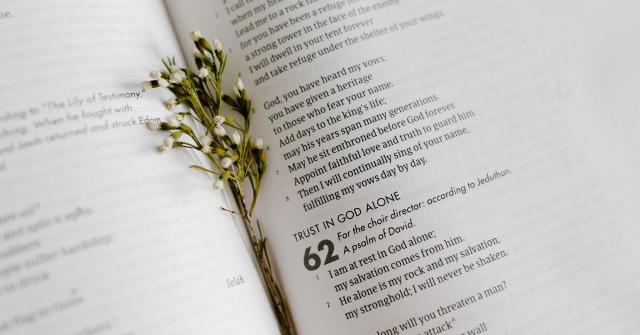
Pentecost as a Vow Renewal Rededication to God's Good News
Pentecost beyond the New Testament
Like many Christians, I grew up associating Pentecost with the Holy Spirit and the New Testament, never to the Old Testament and the 10 Commandments. I had missed the many parallels between the Pentecost narrative and the giving of the 10 Commandments in the Old Testament. Seeing that the roots of Pentecost go 1400+ years back, all the way to Mount Sinai, helped me understand why Jesus connects loving him to keeping his commandments and sending the Holy Spirit. I realized that the gift of the Spirit in Pentecost cannot be understood apart from the gift of the Torah (God’s Word) on Mount Sinai. The giving of the Torah was the wedding ceremony between God and his people, and Pentecost was the vow of renewal, a reaffirmation of God’s covenant with his people and a fulfillment of his promises. Therefore, Pentecost invites a re-dedication to God’s Word in the power of the Holy Spirit.
Parallels between Mount Sinai and Pentecost
First, here are a couple ways that Pentecost and the Giving of the Torah (10 Commandments) connect. Both Pentecost and the Giving of the Torah have wind and fire, expressing God’s presence in creative action. In Pentecost, “the blowing of a violent wind came from heaven and filled the whole house. They saw what seemed to be tongues of fire that separated and came to rest on each of them.” (Acts 2:2-3). The Giving of the Torah also had wind and fire: “Mount Sinai was covered with smoke, because the Lord descended on it in fire. The smoke billowed from it like smoke from a furnace and the whole mountain trembled violently” (Exodus 19: 18-19). God's "blowing" action also connects Pentecost and the Giving of the Torah to the creation of Adam: “Then the LORD God formed a man … and breathed [blowed] into his nostrils the breath of life (Gen 2:7).” There is a creative continuation between Adam, the Giving of the Torah, and Pentecost. I will not elaborate more on that at this time.
During the Giving of the Torah, God descended with fire on a mountain. During Pentecost, God descended with fire on each person’s head. This fulfills God’s promise: "This is the covenant I will make with the people of Israel after that time, declares the LORD. 'I will put my law in their minds and write it on their hearts. I will be their God, and they will be my people.'” (Jer 31:33). Pentecost also fulfills Jesus’ words to the Samaritan woman, that worship is not limited anymore to “x” or “y” mountain, but it has now expanded to each heart where there is Spirit and truth: "Believe me [said Jesus], a time is coming when you will worship the Father neither on this mountain nor in Jerusalem. … a time is coming and has now come when the true worshipers will worship the Father in the Spirit and in truth" (John 4:21-24).
A second parallel between Pentecost and the Giving of the Torah is timing. The Giving of the Torah on Mount Sinai (around 1446 B.C.) happened 49 days after Israel’s great liberation from slavery in Egypt. Pentecost (around 33 A.D.) came 49 days after Jesus liberating humanity from death and sin. The timing connects both events to God’s capacity to liberate.
Love, Good News, and the Holy Spirit
Second, Jesus’ promise of sending the Holy Spirit makes a strong association between the Law [Torah] and the Holy Spirit. In his promise below, Jesus says: " If you love me, keep my commands. And I will ask the Father, and he will give you another advocate to help you and be with you forever—the Spirit of truth" (John 14: 15-17, NIV).
Jesus himself was God’s spoken word (John 1:1): God’s good news to the world, and so were the 10 commandments. God’s 10 commandments (part of the Torah), which can also be translated as "words" were God’s gospel to the people of Israel. God’s 10 words were meant to be refreshing, like poured rain on dry land. Psalm 68 refers to the Sinai experience in these words: "the earth shook, the heavens poured down rain, before God, the One of Sinai, before God, the God of Israel. You gave abundant showers, O God; you refreshed your weary inheritance"(Psalm 68:9, NIV). Just forty-nine days before the Mt Sinai experience, God freed his people from 400 years of abuse and oppression in Egypt. The Israelites were weary and exhausted. God’s 10 Words were refreshing to them because they created an order where fair and fruitful life was possible by placing the love of God first. These 10 Commandments or words were an initial taste of rest for His people. A fuller taste of rest came when they heard Jesus, the incarnate Word of God, saying: “Come to me, all you who are weary and burdened, and I will give you rest” (Matt 11:28).
Psalm 68 continues pointing to the joy around the reception of God’s 10 Words, when it describes the women who proclaim it as a mighty throng (Psalm 68:11, NIV). The Exodus account also says, "Miriam the prophet, Aaron’s sister, took a timbrel in her hand, and all the women followed her, with timbrels and dancing. Miriam sang to them: 'Sing to the LORD, for he is highly exalted. Both horse and driver he has hurled into the sea'"(Exodus 19:20-21).
Women singing good news was common. According to a Jewish commentary1, women were the bearers of news. In groups they made up songs about the news and sang it from town to town. This is a beautiful backdrop to the women who encountered Jesus at the tomb and went proclaiming the news of Jesus’ victory over death.
So, God’s teachings (10 Words) were received in an environment of joy 49 days after He overcame the enemies of Israel. So was Pentecost: 49 days after Jesus defeated the true enemies of Israel—death and sin—God poured out his Holy Spirit over joyful followers of Jesus, who had seen him alive. Pentecost is then a renewed celebration of God’s word and a call to re-dedicate ourselves to study and to practice God’s commands in the power of the Holy Spirit. Because, “Whoever has [his] commands and keeps them is the one who loves [Jesus]. The one who loves [Jesus] will be loved by [His] Father, and [Jesus] too will love them and show [himself] to them” (John 14:21, NIV).
The coming of the Holy Spirit in Pentecost is also a wonderful fulfillment of Jesus’ words from John 14:16, which presents the Holy Spirit as ‘“another” advocate to help [us] and be with [us] forever.” The first advocate or "helper" was God’s Word or Torah. Jesus reminds us that his Word will always be relevant when he says “his words will never pass.” (Matt 24:35). The second advocate, or helper, is Jesus, who came to embody God’s initial words. The Holy Spirit is an advocate or helper who “enables” us to both “remember” God’s words and to “speak” them in a way that is meaningful to all people in the world: "But the Advocate, the Holy Spirit, whom the Father will send in my name, will teach you all things and will remind you of everything I have said to you” (John 14:26). And, "All of them were filled with the Holy Spirit and began to speak in other tongues as the Spirit enabled them" (Acts 2:4).
Let’s remember Pentecost in the light of God’s greatest gifts to the World: His word on Mt Sinai and Jesus as the embodiment of his word. This Pentecost, let’s commit to study, to practice, and to share God’s word enabled by the Spirit and in ways that are understandable for people who need refreshing like dry land.







